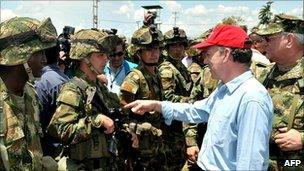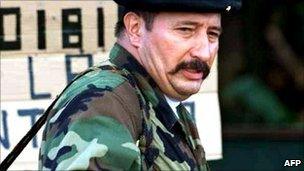Colombia's Santos hails 'beginning of end' for Farc
- Published

President Santos congratulated the soldiers involved in the assault
Colombian President Juan Manuel Santos has hailed the death of a top rebel leader as a "turning point" in the five-decade anti-guerrilla battle.
Mr Santos said the death of Mono Jojoy marked the "beginning of the end" for the Revolutionary Armed Forces of Colombia (Farc).
He urged the rebels to demobilise or face a similar fate.
Mono Jojoy was killed in a large-scale military assault on his jungle stronghold in eastern Colombia.
President Santos was speaking on a visit to congratulate some of the hundreds of soldiers who took part in the raid.
"This operation against Mono Jojoy is a turning point, and I believe, with a good margin of confidence, that we can say this is the beginning of the end for the Farc," he said.
'No let-up'
The president said he had ordered security forces to intensify their pursuit of the rebels in the wake of the most recent success.
"We are going to hunt them in the rivers, in the mountains, in the forests, in the swamps. There is no corner where we will not reach them".
Mr Santos added that information found on computers captured in the operation would allow the security forces to pursue "each and every member of the organisation, their support networks, and their sources of finance".

Mono Jojoy was the senior military commander in the rebel group
Mono Jojoy, 57, also known as Jorge Briceno, was the Farc's military commander and led its strongest fighting unit, the Eastern Bloc.
He was killed in a raid on a Farc stronghold in the Macarena mountain range in the eastern Colombian region of Meta.
After a massive bombardment by air force planes and helicopters, around 800 troops attacked the camp on 22 September.
The army said Mono Jojoy's body was found the next day, alongside at least 20 other dead guerrillas.
He is the latest in a series of senior Farc leaders to die in recent years.
The group suffered severe setbacks during the eight-year government of Mr Santos's predecessor, Alvaro Uribe, who made fighting the rebels his top priority.
But it has shown that it is still has substantial offensive capability, killing at least 40 members of the security forces in attacks since Mr Santos took office in August.
The Farc has been written-off as a fighting force several times during its five-decade campaign to take power, only to fight back, supported by revenues from cocaine-trafficking.
The rebels have said they are prepared to find a political solution to the conflict, and have appealed to Mr Santos to enter talks.
Mr Santos has said they must halt attacks and release all the hostages before negotiations can take place.
- Published25 September 2010
- Published24 September 2010
- Published23 September 2010
- Published23 September 2010
- Published23 September 2010
- Published29 August 2013